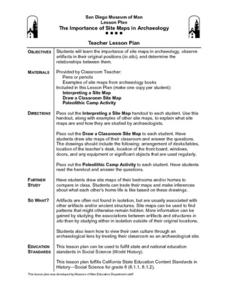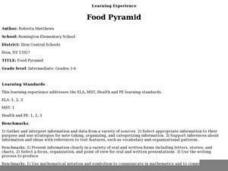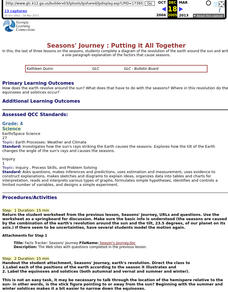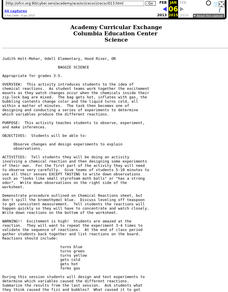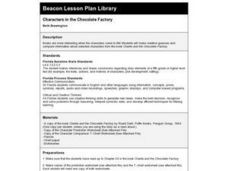Curated OER
Learning From Leaves: Adaptations To Differing Light Levels
Students, in groups, examine plants with different light levels. They are given plants from a tropical and desert region. They write a hypothesis at the beginning of the experiment.
Curated OER
The Importance of Site Maps in Archaeology
Students consider the importance of site maps in archeology. They interpret site maps, draw site maps of their classroom and home and then participate in simulated Paleolithic archeological camp activity.
Curated OER
Food Pyramid - Daily Diet Diary
Learners keep a daily diet diary and discuss the Food Pyramid. They investigate other geometric shapes as a way to display daily food guidelines. In groups, they design a menu for the Food Pyramid Restaurant.
Curated OER
Don't Use it All Up
Students observe the way that a sponge absorbs liquids and discuss how we our use of natural resources affects the environment around us. They discuss the need to conserve resources so we don't run out of what we need.
Curated OER
Migration Migraine
Students partipate in a demonstration in which they role play animals migrating between breeding and wintering habitats and encountering hazards at each end of the journey.
Curated OER
Documenting Where We Are
Pupils contribute to discussions and identify how an artist elicits a viewer's response. They use William Henry Jackson's Pawnee Indian Village, photograph and painting. After analyzing this information, students use information gained...
Curated OER
Probability: Playing with Fire
Learners use probability to determine how likely it is for each tree in a small forest to catch on fire.
Curated OER
Utah Archaeology
Students use Play-dough explore different types of fossils and examine how fossils are evidences of past life.
Curated OER
Japan and Art
Students discuss the art of Japan as it relates to Japanese culture and geography and then create individual postcards reflecting the information learned from the lesson. This lesson includes possible enrichments.
Curated OER
Seasons' Journey : Putting it All Together
Third graders complete a diagram of the revolution of the earth around the sun and write a one paragraph explanation of the factors that cause seasons.
Curated OER
Baggie Science
Students work in groups and observe chemical reactions inside zip-lock bags. They use all of their senses, except taste, to observe the reactions.
Curated OER
Artifact Puzzles
Learners role-play the position of archaeologists to determine the different types of artifacts. They cut out a drawing of their object and connect them with their classmates objects. They write an essay about their object and where it...
Curated OER
Earth Day Trash Survey Unit
Young scholars develop an action plan to prevent trash from becoming a problem in the future.
Curated OER
Earth Day Trash Survey Unit
Students analyze the data from questionnaires to prepare a report. They distribute the report via e-mail or through a report published on a Web page to those who participated.
Curated OER
Art Across the Planet
Students create drawings of their own homes and those that they imagine might be found in a foreign country, conduct research on that particular foreign country using exchange artwork and questions with another group of students in that...
Curated OER
Reading Strategies for Elementary Students
Students practice using strategies to help them read. They participate in activities that help them sound out words and determining the main idea. They also examine good and bad reading habits.
Curated OER
The Time I Got Lost
Third graders go through the writing process but substitute paper and pencil with the computer to create a story about "The Time I Got Lost".
Curated OER
What You See Is What You Get
Students practice visualization as a strategy for reading and comprehending math word problems.
Curated OER
Characters in the Chocolate Factory
Students dress and act as selected characters from Roald Dahl's "Charlie and the Chocolate Factory". They identify each other and make predictions about the upcoming chapters based on their observations about the characters.
Curated OER
Comparing Amount of Rainfall in Different Geographical Areas
Students construct rain gauges and use them to log rainfall in their school zone, local city, and region and then compare and discuss them by plotting this information.
Curated OER
From Home to Nome
Third graders develop and create an electronic portfolio on their hometown, school, and themselves to send to a school on the Iditarod Trail. They gather information from the Internet, printed materials, and a digital camera.
Curated OER
Author, Author!
Third graders, in groups, select and research a favorite studenT author or illustrator. They answer questions about the author, conduct research and prepare a PowerPoint presentation with their findings.
Curated OER
Learning From Leaves: Adaptation Scavenger Hunt
Students participate in an adaptation scavenger hunt at. They obtain various plant specimens, and sort the plants based on whether they came from a desert, tropical rainforest, or wetlands.
Curated OER
The Heat is On
Third graders experiment with heat through investigations. They rub objects together and compare the relative differences in the amount of heat given off. They write in their journals about the results they find.



